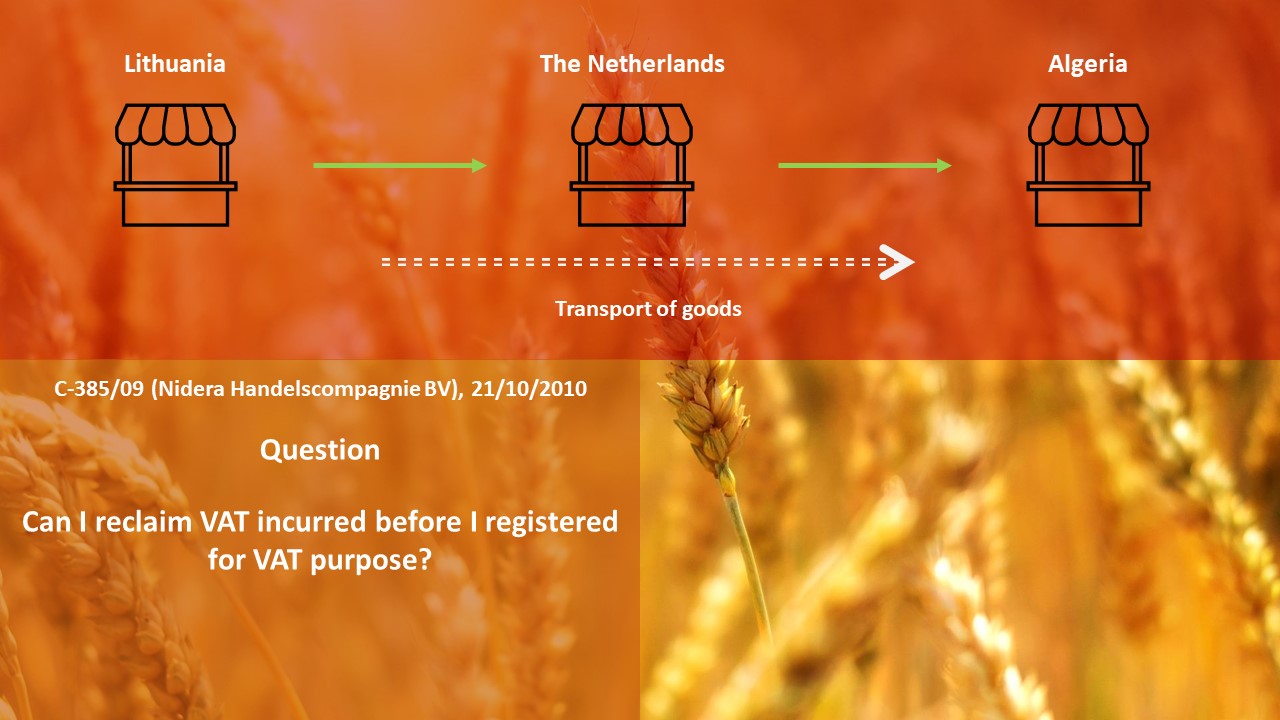The danger of being careless with VAT
Very often a company does not care directly about the VAT treatment of its foreign activities. The main focus is on sales and the conclusion of contracts to boost turnover. In this process, VAT is at worst ignored, at best treated as a minor issue with no impact on the smooth running of the business.
However, a wrong VAT approach to the initial situation can be detrimental to the company's finances. Because in every country, the tax administration waits patiently for a small mistake by its opponent to start the hostilities.
This is the misfortune that suffered a Dutch company in Lithuania.
The case
A Dutch company active in the international trade of raw materials buys wheat from Lithuanian suppliers. The Lithuanian suppliers issued invoices with local VAT. The Dutch company then exports all the wheat to third countries (Algeria and Turkey), applying a 0% VAT rate to the export.
When it wanted to recover Lithuanian VAT, it realised that it could only do so if it was identified as a VAT payer. It began to approach the Lithuanian tax authorities to register for VAT six months late and obtained a VAT number. It regularized its situation in its first VAT return and claims the VAT refund from the local Treasury.
The case in a nutshell

The VAT dispute
The Lithuanian tax authorities, sensing a good opportunity, refused to refund the VAT on the grounds that the wheat in question, having already been sold, would no longer be used for the purposes of its VAT-registered operations. This is a very flimsy reason for refusal!
The Dutch company then embarked on an administrative and then a judicial process. The case ended up before the Court of Justice, which had to decide the following question: can the right to deduct VAT be denied on the sole ground that the company was not identified for VAT purposes?
The answer of the Court of Justice
In a clear and succinct ruling, the Court recalls the following principles:
- A taxable person is entitled to deduct VAT paid in a country in respect of goods supplied to him by another taxable person which are used for the purposes of his business. In this case, the Dutch company exported all the wheat it had purchased in Lithuania to third countries, applying a VAT rate of 0%. Therefore, it has the right to deduct the VAT paid on these goods in Lithuania. This right arises at the time when the deductible tax becomes chargeable.
- The exercise of the right of deduction is subject to a single formal condition, namely that the Dutch company must hold an invoice drawn up in accordance with the VAT rules. In the case in point, the Dutch company has a valid invoice from its Lithuanian supplier.
- VAT identification is not an act constituting the right to deduct but a formal requirement for control purposes.
It is true that a business that does not comply with the formal requirements laid down in the VAT Directive may be liable to an administrative penalty. But this negligence does not allow the tax administration to take advantage of it to undermine the sacrosanct principle of the right to deduct which remains an essential part of the whole VAT system.
Source: Case C-385/09 (Nidera Handelscompagnie BV), 21/10/2010
The expert's eye
This case is a perfect illustration of the dangers incurred by a company that decides to trade abroad without considering the VAT treatment of its activity.
By considering VAT as a subordinate issue, the machine has completely seized up. And the results?
- A cash flow burdened by a €3.4 million VAT credit blocked for several years;
- A fierce administrative and legal battle against the Lithuanian tax authorities, which (fortunately) ended in court.
In short, a lot of trouble and money spent for nothing. Because if the company had taken the trouble to inform itself correctly from the start, it would have known that Lithuanian VAT regulations required prior VAT registration in order to be able to reclaim VAT on its purchases.
Contact us
Any VAT question ?
We offer you the opportunity to discuss the subject during a free videoconference.
